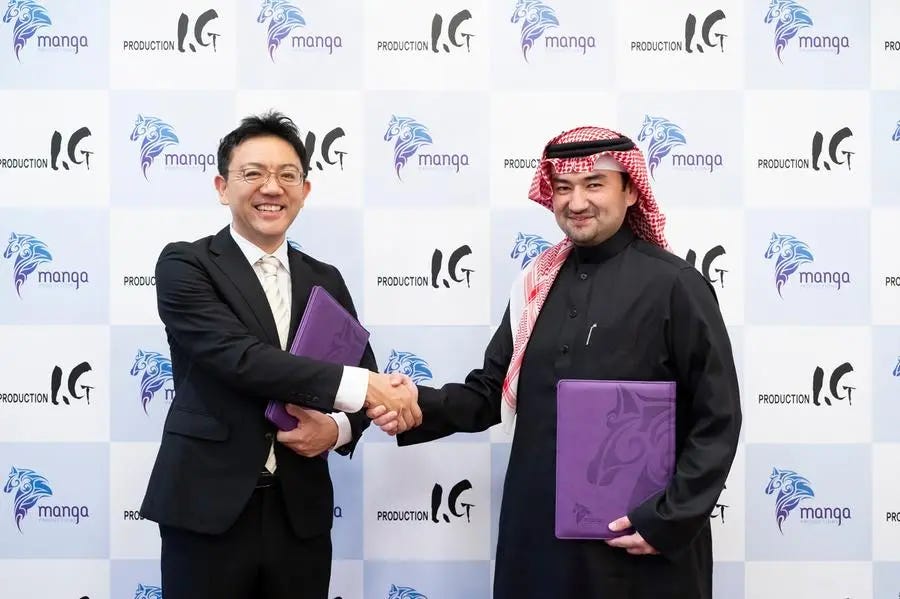Saudi company beat Crunchyroll in regional anime license deal
Plus: 'My Hero Academia' builds on success overseas; Anime studios fight producers for profits; Webtoon studio head wants manga in advertising; and more
This is your weekly Animenomics briefing, covering the business of anime and manga. Today is Wednesday, November 22, 2023.
In case you missed it: Anime NYC, which has quickly become the second largest anime convention in the United States since its creation in 2017, is moving from its traditional November dates to August in 2024.
What we’re watching: Summer is peak anime convention season in the United States, and next year will be a test whether Anime NYC can continue to draw attendees amid risk of convention fatigue.
Saudi company secures ‘Great Pretender’ sequel license

Saudi anime production and distribution company Manga Productions has landed the master license to Great Pretender Razbliuto, beating out Crunchyroll in Middle East and North Africa markets in a deal with Production I.G.
Why it matters: Manga Productions, a subsidiary of the non-profit foundation sponsored by the Saudi crown prince, shows that regional anime industry players can still carve market share away from the increasingly dominant Crunchyroll.
The details: Manga Productions will hold the master license to Great Pretender Razbliuto in 18 territories—Algeria, Bahrain, Egypt, Iraq, Jordan, Kuwait, Lebanon, Libya, Morocco, Oman, Palestine, Qatar, Saudi Arabia, Sudan, Syria, Tunisia, the United Arab Emirates, and Yemen.
DMM TV, a streaming platform by Japanese e-commerce giant DMM.com, will broadcast the series domestically, while Crunchyroll will stream it in all other international markets except mainland China.
Yes, but: With the original Great Pretender license for the 2020 series being held by Netflix, viewers must face the reality that anime licenses for an intellectual property can be shift among different parties, with one season being shown on one streaming platform and the next season on another.
Rewind: Manga Productions’ deal with Production I.G is the latest in a series of agreements the company has signed with anime production companies since it repaired relations with Toei Animation in 2017.
The Weekly Toyo Keizai business magazine recently reported that anime companies are increasingly attracted to Saudi companies and their oil-driven wealth as new sources of investment.
Overseas sales sustain ‘My Hero Academia’ popularity

Overseas demand for the My Hero Academia manga and continued interest in its anime adaptations are sustaining the growth of the series worldwide even as the its popularity wanes domestically in Japan, according to a new analysis by Atsuo Nakayama, an entertainment industry expert.
Why it matters: As My Hero Academia draws closer to the coveted status of having 100 million copies of its manga in circulation, most of the growth in new copies is happening in overseas markets.
By the numbers: Between April 2021 and January 2023, the number of manga copies in circulation globally grew 70 percent to 85 million copies.
Approximately 57 percent of that growth happened in overseas markets, with the number of manga copies published overseas more than doubling.
Each new anime adaptation of My Hero Academia results in a bump in manga circulation, and the most recent sixth season generated a bigger interest boost abroad than in Japan, according to Google Trends data.
Bottom line: “It seems that the words of the heroes and villains that appear in this work resonate more strongly with people overseas in places where society has not yet caught up with the increasingly diverse reality of LGBTQ and other social issues,” Nakayama writes.
Clippings: AI-assisted ‘Black Jack’ manga published

Osamu Tezuka’s Black Jack manga has a new 32-page chapter printed in Weekly Shonen Champion today that was produced with the assistance of generative AI models GPT-4 and Stable Diffusion. (Kyodo News)
Anime merchandise sales are slowing down in the United States after the rapid growth of recent years. One manufacturer blames the anemic growth on the lack of new licensed content and products. (Licensing International)
Porco Rosso began screening in Chinese theaters for the first time on Friday, with the 1992 Hayao Miyazaki film being distributed by Beijing-based Road Pictures, which successfully brought Suzume and The First Slam Dunk to that market earlier this year. (China Internet Information Center)
Box office data provider Endata reports Porco Rosso earned ¥12 million RMB (US$1.7 million) and was seen by more than 333,000 people over the opening weekend.
Crunchyroll’s digital manga service, originally launched in 2013 in partnership with Kodansha USA, will end operation in December. (Anime News Network)
As previously reported by Animenomics, Kodansha launched a standalone manga app in the United States earlier this year without the involvement of its local subsidiary.
Anime studios fight for a share of production profits
“TV stations, merchandise companies, and film distributors get together to provide money, and in return, the profits are divided. But studios aren’t rich in the first place, so they can’t participate in this and don’t get any share of the profits. People are starting to realize how unfair this is, and starting to think that studios should hold at least part of their own IPs.”
— Ayano Fukumiya, voice actor and spokesperson for the Nippon Anime & Film Culture Association
Context: In a comprehensive 9,000-word interview with Full Frontal, Fukumiya and animator Terumi Nishii describe to Matteo Watzky the range of challenges facing the anime industry, from the proliferation of studios that “have money but no people” to the possibility of unionization by Japanese animators.
Webtoon studio head wants more manga in advertising

Yohei Imoto is the studio head of Japan’s leading webtoon intellectual property production company, Whomor, and he has a lofty goal: to create webtoon, also known as vertically-scrolling manga, content that can compete with Anpanman for children’s attention by 2030.
Why it matters: Anpanman, the superhero title character of a children’s picture book (more than 80 million copies in print) and anime series (airing since 1988), is a force to be reckoned with in the Japanese character business.
The Japan Times reported in 2018 that the franchise earns an estimated ¥100 billion (US$670 million) to ¥120 billion (US$806 million) in revenue each year.
What they’re saying: In a post written on the Whomor Comic Studio official blog on Note, Imoto describes how Anpanman captured his daughter’s attention even though he considered not introducing her to Anpanman.
“Anpanman lurks in places I never expected, such as baby gifts and collaborations with diapers, and it instantly captivated my daughter,” Imoto wrote. “Before I knew it, she started requesting videos of Anpanman toys on YouTube.”
He continued, “As a result, she became so taken in that we subscribed to the Anpanman Channel, we went to the Anpanman Museum, she put herself to bed with an Anpanman picture book, and she even chose to wear an Anpanman costume for Halloween.”
Between the lines: Drawing parallels with Anpanman’s business model, Imoto told attendees of a lecture at a vocational school that he believes manga can also be integrated into advertising strategies.
Imoto points to Shinken Seminar, a distance learning program by education company Benesse, as an example where compelling manga stories are already used to promote the services of the business.
“We are now entering an era in which the value of manga artists is the highest in the history of the manga industry,” Imoto wrote.
Animenomics is an independently-run and reader-supported publication. If you enjoy this newsletter, consider sharing it with others.


